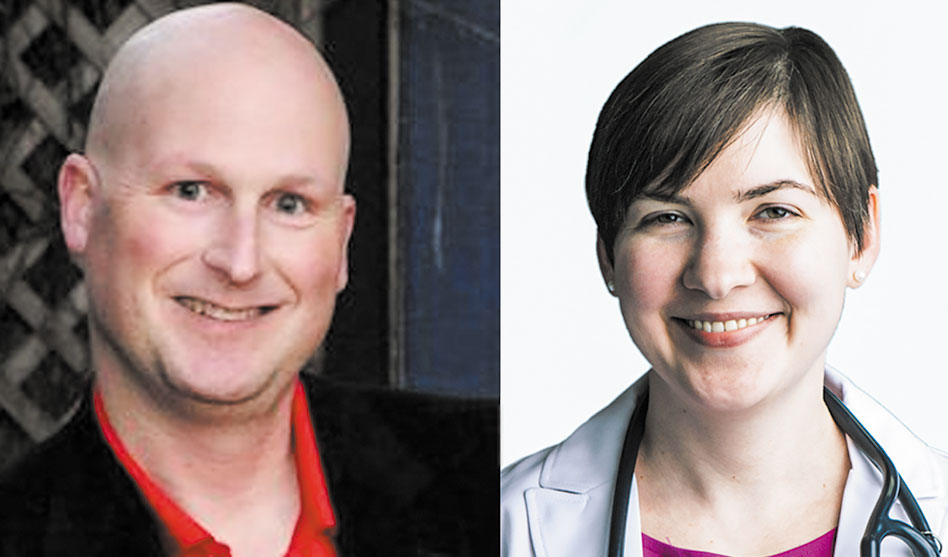State Rep. Tony Tinderholt, left, and Houston endocrinologist Dr. Jessica Zweiner sparred over the complex science of gender recently in a House committee meeting
Anti-LGBTQ bills are advancing in the Texas House and Senate
JAMES RUSSELL | Contributing Writer
james.journo@gmail.com
From the same people who banned abortions and liberated lemonade stands comes the new greatest threat to our very existence: transgender college athletes, drag queens and puberty blockers.
In the past two weeks, members of the Texas Legislature have debated multiple issues related or alluding to the LGBTQ community. On Friday, March 24, the powerful Senate State Affairs Committee heard Senate Bills 12 and 1601 by Sen. Bryan Hughes, an East Texas Republican, questioning what constitutes a drag performance and where they can take place. SB 12 would ban any “sexually-oriented performance” in public where children are present. SB 1601 would deny state funding to libraries where so-called “drag time story hours” occur.
On Monday, March 27, the House Public Health Committee heard House Bill 1686 by Rep. Dr. Tom Oliverson, a physician and Republican from the Houston area, questioning the science of healthcare for transgender youth.
The debate came down to differences in the science and studies on how non-surgical, gender-affirming care helps or, in some cases, hurts transgender youth.
Dr. Quentin Van Meter, an Atlanta, Georgia pediatric endocrinologist and president of the conservative American College of Pediatricians, was the resource witness, the legislative term for an expert in the field. Democrats on the committee noted a court previously ruled Van Meter, in fact, was not an expert.
Transitioning, Van Meter said, “tears apart the fabric of the family.” However, one of his biggest concerns was that early transitioning harms gay men.
“It harms the gay community because it takes away sexual function. If that person is going to resolve their gender dysphoria, and identify as same-sex attracted, that person will not have a sex life,” he said.
Dr. Jessica Zwiener, a Houston endocrinologist, pushed back: “I believe that in many cases, the answer is transition. I believe it’s important to listen to the child or the adolescent and help them work through any mental health issues, help them figure out the risks and benefits of social transition and medical transition,” she said.
“The goal of treatment for me is not to have a kid who says they’re cisgender, it’s to have a kid who is happy and functional and able to be a human, a functioning adult without having to think about gender roles,” Zweiner added.
But what Rep. Tony Tinderholt, an Arlington Republican, really wanted to know was, “What’s a woman?”
“It sounds like an easy question, but it’s a complicated question,” Zweiner replied, citing conditions where chromosomes may not connect or a woman was born without some defining trait.
“A woman is not just somebody who has [ovaries],” she continued. “What about the woman with androgen insensitivity, who is genetically XY and doesn’t have ovaries, but feels like she’s a woman, looks like she’s a woman?” she said.
“You say it’s complex. I can tell you what a woman is all day long,” declared Tinderholt, parroting a GOP talking point lifted from right-wing Republicans in Congress.
Zweiner, however, continued to maintain that science is complex.
Most House Republicans have signed onto HB 1686, indicating it has the votes to pass. The six holdouts include Richardson Rep. Angie Chen Button and Corpus Christi Rep. Todd Hunter.
In the Senate
The Senate hearing was less complex, with supporters claiming that the legislation restricting drag performances would prevent children from being exposed to highly sexualized experiences.
But opponents outnumbered supporters in both hearings. In the case of the drag shows, opponents argued the measures could chill the First Amendment and have devastating economic consequences.
Paul Buchta, CEO of the trade group Austin Texas Musicians, said the bill’s broad language would prevent major bands from performing in public venues. “By this definition, it would be illegal for the bands like Motley Crue, KISS and others who wear stage makeup to play in all-ages venues and festivals,” he said.
The bill also opens musicians, performers and venues to lawsuits. “The broad nature of the bill’s language inadvertently puts a countless number of artistic performers under fire by subjecting them, and the venues that employ them, to devastating legal consequences,” he added.
To Tina Cannon, the president and CEO of the Austin LGBT Chamber of Commerce, the ban would also have economic consequences.
“Drag performances are a significant part of the entertainment industry in Texas, drawing large crowds and generating revenue for local businesses. A ban on drag would lead to a loss of income, tourism and revenue negatively impacting the state’s economy,” she said.
Other opponents emphasized kids are already exposed to what one would consider overt sexuality, namely the bars Hooters and Twin Peaks.
If there were any point opponents and proponents agreed upon, it’s children shouldn’t be subjected to sexually explicit performances.
“The children of Texas deserve to be protected from sexual entertainment, but I asked that bills aimed at protecting access by children ensure that they are protected from all harmful adult content, regardless of the outfit or gender,” said Christina, who only used her first name and who opposed the bills.
These Senate bills are likely to be voted out by that chamber, as have others, including SB 15 by Sen. Mayes Middleton, a Galveston Republican, which on Tuesday, March 28 passed in the upper body with little debate. SB 15 requires college athletes to compete according to their sex at birth. SB 15 needs to jump through only one more technicality before heading to the House.











